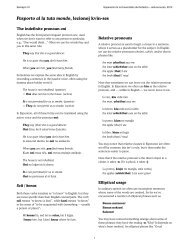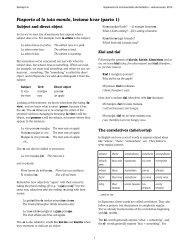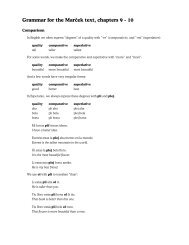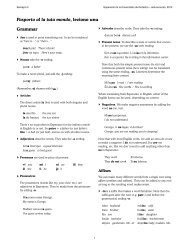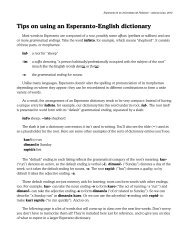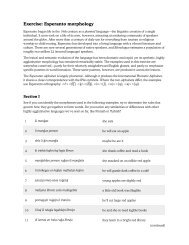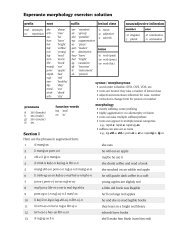The alphabet and pronunciation - Lodestone
The alphabet and pronunciation - Lodestone
The alphabet and pronunciation - Lodestone
- No tags were found...
You also want an ePaper? Increase the reach of your titles
YUMPU automatically turns print PDFs into web optimized ePapers that Google loves.
! Li prenis la jakon de sur la hoko.! He took the jacket off the hook.! La muso kuris de sub la lito.! <strong>The</strong> mouse ran from under the bed.However, instead of de en (from in = out of), we have a separatepreposition with this meaning, el:! La viro iris el (= de en) la domo.! <strong>The</strong> man went out of (= from in) the house.! Li trinkis el glaso.! He drank from (= out of) a glass.Changing endings5 In chapter 3 (note 1) we changed adjectives into adverbs by changingtheir endings from -a to -e, <strong>and</strong> in this chapter (note 2) we changed anoun (hejmo a home) to an adverb (hejme at home; hejmen to one’shome, homewards).Similarly, we can make adjectives from nouns by changing -o to -a:! muro a wall! mura bildo a wall (mural) picture! urbo a town! urba parko a municipal park! intereso an interest! interesa libro an interesting bookIn the same way, from nordo (the) north, we can make norda northern,norde in the north <strong>and</strong> norden to the north, northwards, <strong>and</strong> from supro(the) top we can make supra top (adj.), supre at the top <strong>and</strong> suprentowards the top, upwards.6 <strong>The</strong> ending -u:When giving direct comm<strong>and</strong>s, the verb ends in -u:! Iru al la pordo!! Go to the door!! Ne iru en la "ardenon!! Don’t go into the garden!As in English, the person addressed is not usually named:! Venu rapide!! = Vi venu rapide!! Come quickly! = You come quickly!! Estu bona!! = Vi estu bona!! Be good!! = You be good!We can't give comm<strong>and</strong>s to ourselves or directly to a third party, but it'spossible to express our will (wish, desire). In English we use the verb“let” for this: “Let me do it”, “Let him wait”, etc.:! Ni iru al la kinejo.! Let’s go to the cinema.! #i staru en la angulo.! Let it st<strong>and</strong> in the corner.! Li atendu.! Let him wait.! Ili venu al ni.! Let them come to us.To say “Let’s (do something)” in Esperanto, we say “Ni ... -u”Sometimes the meaning is a wish or exhortation (in English wesometimes use “may”):! La Nova Jaro estu feli$a por vi!! May the New Year be happy for you!! %u li atendu?! Shall he wait?



